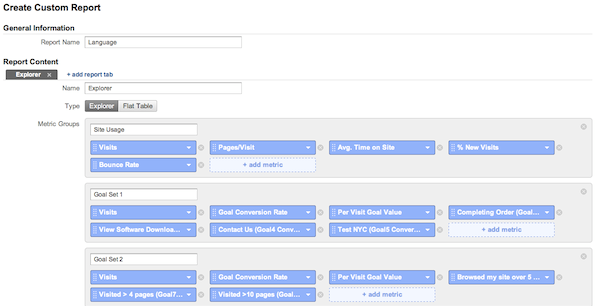With a new "Customize" button in the action bar on all tabular standard reports, Google Analytics has allowed users to tweak standard reporting to a more customized approach. The Customize option will take Analytics users to a custom report builder that according to Google, can be used in certain cases as:
- "New metrics, familiar reports – The best metrics are the ones that provide actionable insights into your business. Try adding different metric groups to your favorite reports to see if how it impacts your view of conversion rates.
- Drill down into your data – Sometimes, the best route to a particular piece of data is a drilldown not found in any standard report. You could customize the Language report to drill into search terms for a language-by-language comparison of your organic search traffic.
- Filter to find insights – Ad campaigns can span many networks. Try customizing the AdWords Campaigns report and applying a filter for Ad Distribution Network matches "Google Search" to see your performance on only Google Search."
Google has also clarified that all standard reports cannot be turned into custom reports. In fact only the reports where you can spot the ‘Customize’ button can you turn the report. Google Analytics help center has more details on customizing a report.
Google Analytics has updated its list search engine list and from the 1st of this month, there have been new search engines added to the list. This search engines list is used by Google Analytics to auto-populate organic traffic. While you can add, search engines manually into the tracking code snippet, but this time Google Analytics has made these additions itself.
The search engines now part of the default list are:
Google has made another change which will probably lead to your search.com traffic showing a decline while traffic from other engines might pick up. This is because there has been a change made to the way Google Analytics recognizes search engines. Earlier, all the traffic was attributed to search.com; as any URL with the word “search” and a query parameter “q” was attributed by Google to search.com. This led to reports that were not correct (specially in reference to customized search engines).
But after February 1st, Google has changed its logic and the customized search engines will not be shown as search.com anymore.
Now these large customized search engines has been added to the default list of search engines with “search” in them. Here is the list:
- http://search.conduit.com
- http://search.babylon.com
- http://search-results.com
- http://isearch.avg.com
- http://search.comcast.net
- http://search.incredimail.com
To conclude, now those of you getting large amount of organic traffic, will see search.com organic traffic reducing while the other engines will start showing up as source. Please note that this will have no effect on your organic traffic from Bing or Google.




